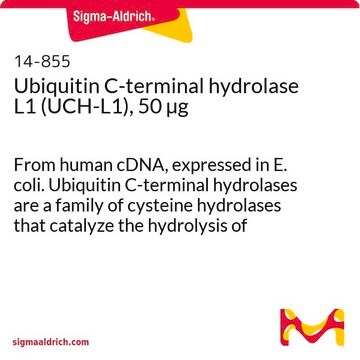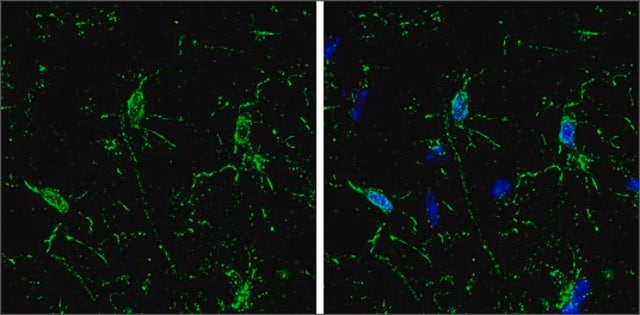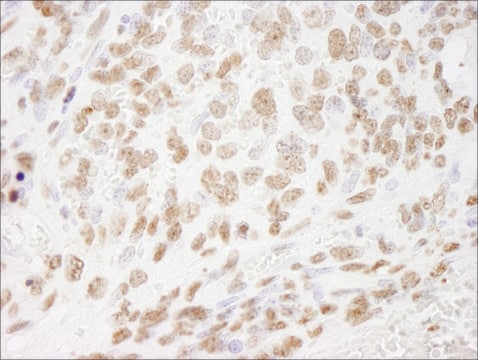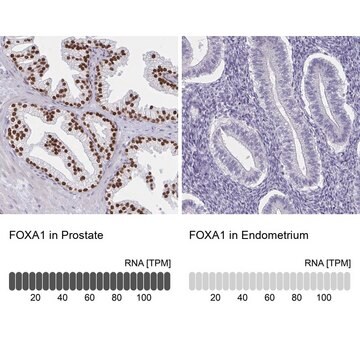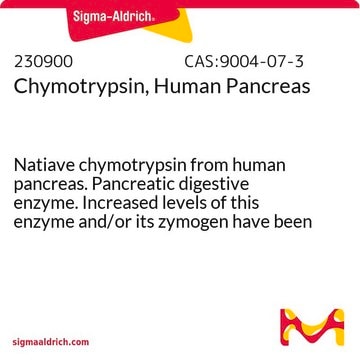14-856
Ubiquitin C-terminal hydrolase L3 (UCH-L3), 50 µg
From human cDNA, expressed in E. coli. Ubiquitin C-terminal hydrolases are a family of cysteine hydrolases that catalyze the hydrolysis of amides, esters & thioesters of the C-terminus of ubiquitin.
Iniciar sesiónpara Ver la Fijación de precios por contrato y de la organización
About This Item
UNSPSC Code:
12352200
eCl@ss:
32160405
NACRES:
NA.32
Productos recomendados
biological source
human
Quality Level
recombinant
expressed in E. coli
specific activity
>1000 pmol/min-μg, 25 °C (with 1 μM ubiquitin-AMC as substrate and UCH-L3 at 20 pM (0.58 ng/mL).)
mol wt
Mw 26.2 kDa
manufacturer/tradename
Upstate®
NCBI accession no.
UniProt accession no.
shipped in
dry ice
General description
Produced from human cDNA, expressed in E. coli. Ubiquitin C-terminal hydrolases (UCHs) are a family of cysteine hydrolases that catalyze the hydrolysis of amides, esters and thioesters of the C-terminus of ubiquitin. UCH-L3 is a member of the lower molecular weight group of UCHs involved in the hydrolysis of small C-terminal derivatives of ubiquitin that form non-specifically during the process of protein ubiquitinylation.
Product Source: Recombinant human UCH-L3 expressed in E.coli.
Application
From human cDNA, expressed in E. coli. Ubiquitin C-terminal hydrolases are a family of cysteine hydrolases that catalyze the hydrolysis of amides, esters & thioesters of the C-terminus of ubiquitin.
Storage and Stability
Store at -70°C for up to 12 months from date of receipt. As supplied, the enzyme is stable on ice for several hours. Activity is stable up to 6 freeze/thaw cycles (snap freezing in a dry/ice ethanol bath or liquid nitrogen).
Legal Information
UPSTATE is a registered trademark of Merck KGaA, Darmstadt, Germany
Disclaimer
Unless otherwise stated in our catalog or other company documentation accompanying the product(s), our products are intended for research use only and are not to be used for any other purpose, which includes but is not limited to, unauthorized commercial uses, in vitro diagnostic uses, ex vivo or in vivo therapeutic uses or any type of consumption or application to humans or animals.
Storage Class
12 - Non Combustible Liquids
wgk_germany
WGK 1
flash_point_f
Not applicable
flash_point_c
Not applicable
Certificados de análisis (COA)
Busque Certificados de análisis (COA) introduciendo el número de lote del producto. Los números de lote se encuentran en la etiqueta del producto después de las palabras «Lot» o «Batch»
¿Ya tiene este producto?
Encuentre la documentación para los productos que ha comprado recientemente en la Biblioteca de documentos.
K D Wilkinson et al.
Journal of molecular biology, 291(5), 1067-1077 (1999-10-16)
The ubiquitin fold is a versatile and widely used targeting signal that is added post-translationally to a variety of proteins. Covalent attachment of one or more ubiquitin domains results in localization of the target protein to the proteasome, the nucleus
Roles of ubiquitinylation in proteolysis and cellular regulation
Wilkinson, K D
Annual Review of Nutrition, 15, 161-189 (1995)
L J Kurihara et al.
Molecular and cellular biology, 20(7), 2498-2504 (2000-03-14)
Mice homozygous for the s(1Acrg) deletion at the Ednrb locus arrest at embryonic day 8.5. To determine the molecular basis of this defect, we initiated positional cloning of the s(1Acrg) minimal region. The mouse Uch-L3 (ubiquitin C-terminal hydrolase L3) gene
Shahram Misaghi et al.
The Journal of biological chemistry, 280(2), 1512-1520 (2004-11-09)
Ubiquitin C-terminal hydrolases (UCHs) comprise a family of small ubiquitin-specific proteases of uncertain function. Although no cellular substrates have been identified for UCHs, their highly tissue-specific expression patterns and the association of UCH-L1 mutations with human disease strongly suggest a
Kinetic and mechanistic studies on the hydrolysis of ubiquitin C-terminal 7-amido-4-methylcoumarin by deubiquitinating enzymes.
Dang, L C, et al.
Biochemistry, 37, 1868-1879 (1998)
Nuestro equipo de científicos tiene experiencia en todas las áreas de investigación: Ciencias de la vida, Ciencia de los materiales, Síntesis química, Cromatografía, Analítica y muchas otras.
Póngase en contacto con el Servicio técnico